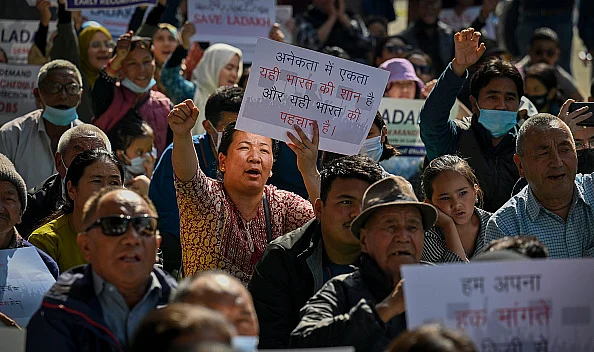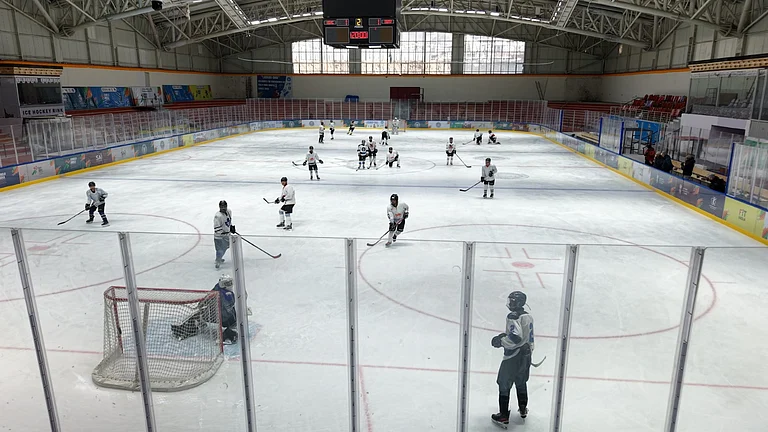After the recent deadlock between the Centre and Ladakhi leaders over the demands for statehood and the Sixth Schedule, experts caution that New Delhi may have overlooked Ladakh’s determination or disregarded its concerns due to its smaller population size.
The experts say it is important for New Delhi to carefully consider multiple factors before making any decision, given Ladakh’s strategic position with boundaries shared by India’s two adversaries. Political instability in Ladakh could have grave consequences that India cannot afford to ignore, they warn.
The Leh Apex Body (LAP) and the Kargil Democratic Alliance (KDA) have been engaged in dialogue with the Centre since 2023. They are advocating for full statehood for Ladakh, the extension of the Sixth Schedule to the region, the establishment of a separate public service commission, and the allocation of one parliamentary seat each for Kargil and Leh. With the Centre providing a firm response regarding their primary demands of statehood and the Sixth Schedule, the pressing question remains: What course of action will these political groups from Leh and Kargil pursue next?
Praveen Dhonti, Senior Analyst India, Crises Group, tells Outlook that after reorganising the erstwhile state of Jammu and Kashmir into two union territories in 2019, the Centre never promised statehood to Ladakh unlike it did to J&K. “Prime Minister Narendra Modi himself assured the people of Kashmir that the statehood will be restored and elections will be held but there is no progress on that front yet. So, it is unlikely that New Delhi will grant statehood for Ladakh, as it is tied up with the border crisis with China and also the government’s plans in Kashmir,” Dhonti said.
“Granting the Sixth Schedule will set a precedent that will be difficult for the central government to deal with. For instance, the Kuki-Zo community is also demanding a separate administration and Sixth Schedule in Manipur at the moment. It might, however, grant some concessions beyond the framework of statehood and sixth schedule, eventually, regarding safeguards to protect culture, language, land, ecology, and employment,” Dhonti added.
However, Siddiq Wahid, a Senior Visiting Fellow at the Centre for Policy Research (CPR) in New Delhi and a Fellow at the Institute of Chinese Studies (ICS) in Delhi, said, “New Delhi has either underestimated Ladakh’s resolve in resisting the threat to its unique cultural identity after August 2019 or does not take Ladakhis seriously because of its demographic size. Either way, it is destabilising a boundary with India’s two adversaries. It will spawn new national security threats, something that India cannot afford. Surely, someone recognises that?”
On the political front, the formation of the Leh Apex Body as an amalgam of different political and religious organisations in 2020 was an event in itself. The organisation was formed to fight for the Sixth Schedule for the Ladakh. The Bharatiya Janata Party (BJP) is part of the Leh Apex Body, which is currently headed by Thupstan Chhewang, a well-respected leader in the Ladakh region, who has been a Member of Parliament from Ladakh twice. He resigned from the parliament and the BJP in 2018 and since then has devoted himself to the fight for the sixth schedule for the Ladakh.
Similarly, in Kargil, political parties formed the Kargil Democratic Alliance in 2020 and they began their agitation by calling the abrogation of Article 370 unconstitutional and seeking reunification with Jammu and Kashmir. In fact, three top leaders of the Kargil Democratic Alliance —Qamar Ali Akhoon, Asgar Karbali, and Sajad Kargili— were part of the petition filed before the Supreme Court challenging the abrogation of Article 370. In the past two years, the demands of the Kargil Democratic Alliance and the Leh Apex Body have converged.
On January 2, 2023, the Ministry of Home Affairs (MHA) established a high-powered committee led by the Minister of State for Home, Nityanand Rai, to address key concerns arising in the Union Territory of Ladakh. The committee was tasked with engaging Ladakhi leaders to devise comprehensive measures aimed at safeguarding the region’s distinctive culture and language, considering its unique geographical position and strategic significance. The mandate of the committee was also to ensure the protection of land and employment, measures related to the empowerment of Ladakh Autonomous Hill Development Councils (LAHDCs) of Leh and Kargil and constitutional safeguards. The formation of the committee had elated the people of the region when it was established and they saw it success of their agitation.
The Ministry of Home Affairs sub-committee on February 19 held a meeting in New Delhi with the Ladakhi leaders. The meeting was described as successful by the Ladakhi leaders. However, the latest meeting on March 4 did not yield any result as many leaders from Ladakh described it as a failure.






















